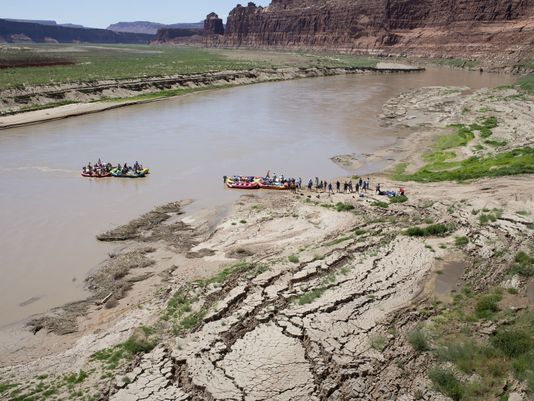Water We Waiting For? Water Conservation NOW! . . . by Nicholas Martell

As I walk into the Hilton hotel for the 107th Arizona Town Hall Meeting, I find myself in unfamiliar territory. What the hell am I doing in a Hilton hotel in the first place? This is me, a scruffy, 29 year old graduate student who refuses to cut (or regularly comb) his thick, John Fogerty-esque mane. None of my favorite shirts come anywhere near a button, and I prefer my shoes to be of the slip-on nature.
When did I become an adult? As I approach the registration table all I can feel is the nagging anxiety of wondering if all of the “adults” at this conference believe I belong at the children’s table. “Welcome to the 107th Arizona Town Hall” said the friendly, but surprised woman at the front desk. “Is this your first time at here?”, she asked. In my most friendly, and enthusiastic voice, I reply “It is!” I think to myself, “dude, was that too much?” and, “am I overcompensating?” The lady kindly informs me of what I’m getting myself into by reviewing the burdensome schedule that we will follow for the next three days. She informs me that cocktail/social hour is starting in half an hour. As I walk to my room, which looks nothing like the “Motel 6” that I am accustomed to, I wonder what on earth an adult cocktail social hour entails. Do real people drink martinis? My version of a cocktail hour is dumping a bottle of $4 champagne into a fifth of vodka and some juice. Am I supposed to talk about Wall Street? What is a 401k again? Luckily, I run into a couple of students, both of whom share my apprehensive feelings.
Perhaps I should elaborate on my interest in attending the Town Hall on Water. I spent much of my undergraduate career bouncing from one major to the next. There were so many excellent majors to choose from, that I kind of treated college like it was a “Costco” on a Saturday afternoon. I flew around sampling everything I could. It was the beginning of my junior year that I ended up in a water sustainability class. I read a piece for an independent project call “The Soft-Path of Water” by Peter Gleick. It changed the way I looked at my wondrous Arizona home. The soft-path is about finding alternatives to large, intrusive water infrastructure, and harmful management practices, and creating simpler, sensible, and sustainable methods for our water consumption. It was so simple. We have been living in this early 20th century water paradigm, and have failed to reinvent ourselves here in the Southwest. I want so desperately to be a part of a new era of water in this breathtaking, but arid region. Okay, back to the Town Hall.
As we stand awkwardly in the middle of the room eating the appetizers and making painful small-talk, we find a semblance of relief as we’re directed into the banquet room for dinner. Dinner! This is a language I understand. It is just me, a piece of chicken, and a fork. There is nothing complicated about it. As we begin eating dinner, we are introduced to former Senator Jon Kyl. Yes, THAT Jon Kyl. Aside from thinking how easy it must have been for him to learn to spell his name, I remember not always being a fan of Mr. Kyl. Either way, I may as well hear what he has to say. Despite Jon Kyl’s best attempt to hypnotize me with his soothing voice, I am able to catch his main message. Former Senator Kyl insinuates that we are not in a water crisis.
He says some nice things about conservation, but how it isn’t enough. Mr. Kyl concludes that it is up to Arizonans to work together to ensure we have plenty of water for the future. That is all great, but I always hate it when people do not feel the urgency I feel regarding our water. Maybe we are not in the same position as California with their tremendous droughts. Does that mean we should not take urgent action? I strongly believe that there will never be “plenty” of water in Arizona. It is something for which we have to fight hard. To suggest otherwise seems unwise.
Anyway, what do I know!? I’m just starving graduate student from Tucson now living in Flagstaff. It is Monday morning. After breakfast, I am directed to a room full of people, all of whom I will be spending the next two and a half days deliberating with regarding complicated water issues in Arizona. I usually thrive at introductions, so I have to think of something clever to say. I address myself as the token graduate student, who may be too idealistic. I get a few chuckles from some of the group. That always puts me at ease. I quickly realize that I am the only millennial out of the whole group, so standing out was not a problem. As the conversation commenced, I stay quiet so as to gauge the general sentiment of the room. During the meeting, I hear just about every point of view a guy can hear about water. The justification of flood irrigation by several farmers is quite surprising. After most comments, the lawyers in the room decide that a conversation could not be complete without it being bogged down with complicated, dry lawyer-speak.
I’m sure it is all necessary, but it sure does not provoke any fireworks in the room. I am shocked to find an egregious lack of Native American voices at the entire Town Hall. Native populations are as important a voice as there is when it comes to water concerns. Just as the night before, I am always confounded by how many people think our water situation is not urgent. Don’t get me wrong, there are scores of people at these meetings that believe we are facing a real problem. I just figured there would be more. After a few minutes, I knew that I could no longer play the role of the uneasy college guy. I’m here for a reason. I have a whole-hearted concern for the future of water in this beautiful state. This is my home. I decide to take the plunge. As I open my mouth, I feel like Peter Pan on a ship full of adult pirates just watching me jump off the plank. No, not even, Peter Pan can fly, he gets pixie dust. I don’t get any pixie dust, unless someone has spiked this tea I’m sipping.
As I conclude my statements, which go something like this: “Hey friends, education is important, mmmkay?” I begin to realize that everyone in this room cares about the future of Arizona’s water. We are all here for different reasons, but we have all made a deliberate decision to be here. Even more importantly, I am here with a millennial voice. In 50 years, I still have a decent chance of being alive. I don’t want to sound heartless, but only a handful of people at the conference share the same odds of living that long.
Each day of the town hall I have to continually remind myself that every voice is important, regardless of whether or not one knows the multitude of acronyms water experts use while verbalizing their thoughts. I go on to stress that educating young people is one of the most valuable, cost-effective tools we have. I also harp on taking soft-path measures, such as utilizing low impact developments (LIDs), capturing rain, recycling water, and creating water friendly landscapes to increase community resilience. I decide to pick my battles, as there are a plethora of opinions being thrown around. At the core of our discussions, we come up with several recommendations to state leaders, and legislators. My voice makes a difference in this process. My apprehension in the beginning of the conference is cancelled out by the satisfaction of being engaged in this community. Maybe I don’t feel like an adult. Maybe I don’t belong in a “Hilton” hotel. Maybe my cocktails are different than those of more advanced age. In the end, all that matters is my desire to take action with regard the Arizona’s water future.
By Day 3, or what’s also called the plenary session, we ended up – with six major recommendations collectively decided by six panel groups working round the clock: Move forward with a strategic vision for water supply sustainability. The Town Hall’s final report has this as its number one recommendation. Well, isn’t this what we just did? This seems like the most vague way of starting out. I suppose it could simply be the overarching goal. We have made a decision that we do not want the few days we spent in cramped rooms to go to waste. I actually admired how much some of the leaders throughout the week clarified over and over that we needed to create a plan for implementing these recommendations. These are not just some cute ideas a bunch of random people have. We are demanding that state, and local leaders take these into consideration.
Create mechanisms to finance water supply and new infrastructures. We can talk until we turn blue about these ideas. The fact is, we are going to do absolutely none of these proposed ideas if we do not come up with a way to pay for them. I know spending money on stuff like this out here in the wild west isn’t always popular, but we have to find a way. We aren’t being picky, we are willing to draw from old, or new sources of funding for updated infrastructures. These include residential and commercial retrofitting, low impact developments, soft path infrastructures, and more. Appropriately fund and staff the Arizona Department of Water Resources.
You’d think that if we need a lot done on water, that we’d have some folks tasked with this effort. Yet, I think our proverbial leaders have just continued to cut this effort. So much for long term strategy. I know Ronald Reagan may not have wanted us to fund this, but I think it is time to move on. We desperately need an entity funded well enough to work on these issues. Educate and make the public aware that we are all “water stakeholders.”
We’re talking low flush, reusable water bottles, innovating our agriculture efforts, turning off the tap when brushing. Furthermore, let’s get our kids talking about these issues! How many kids know about what the Nina, the Pinta, and the Santa Maria are, yet may not know basic water conservation techniques? Why did I have to learn cursive and not learn about rainwater harvesting (sorry to all you cursive fans). This is not an issue that goes away by not thinking about it. Each of us needs to be invested.
Develop specific methods of conservation and augmentation of water. You know how people say the first step to overcoming addiction is to recognize your addiction? I firmly believe the first step to overcoming limited water is to recognize that Arizona is never going to be an oasis. That said, we can do things that conserve, and augment our water. Even the best Sedona crystals can’t make water come out of a rock (I can’t even take credit for that one). I have been to 154 of the best fortune tellers, all in Sedona, and they all say that our water future will be bleak if we can’t conserve what we already have. I promise that is the last Sedona joke. It is time to invest in our communities. We need to understand that every decision we make directly affects all of us.
Resolve existing water disputes. Well, we know water is the new gold and lots of folks have their eyes on supplies. This is not a matter of people just going down to the crick with a jug to fill up enough water to give Johnny and Suzie a bath. There is a complicated history of water rights all over the state. We need pragmatic solutions to ensure all stakeholders have sufficient water for their survival, and a plan to meet future needs.
Back in Flagstaff, armed with the insights from the Town Hall, I spend few hours sleeping and most waking hours on my thesis which involves creating curriculum centered around the soft-path of water. My hope, after graduation, is to implement some of my curriculum in local Arizona schools to really move water sustainability education forward. In the meantime, this millennial will be savoring every…last…drop. Hoping you will too.
For more on the 107th Arizona Town Hall recommendations on water, visit www.aztownhall.org
Nicholas Martell is an NAU student, Action Research Team Facilitator, First Year Seminar/School Gardens, and was a participant in the 107th Arizona Town Hall






A